Night at the Zoo: Power Edition
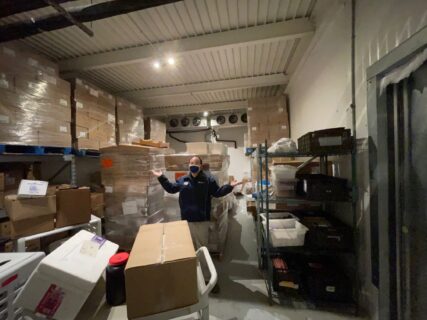 As a child, I remember always feeling a little bit of excitement if the power suddenly cut off. It meant something interesting was going on! Perhaps it was a heavy thunderstorm, or a windstorm, or maybe even an earthquake! (I grew up in California.) My parents inexplicably didn’t share my enthusiasm for suddenly losing electricity to the house. I mean, sure, there were some negatives. No power might mean I was now going to have an early bedtime, and it definitely meant no opening the refrigerator or freezer, but I thought it was well worth the tradeoff to live life for a little while with just flashlights and candles!
As a child, I remember always feeling a little bit of excitement if the power suddenly cut off. It meant something interesting was going on! Perhaps it was a heavy thunderstorm, or a windstorm, or maybe even an earthquake! (I grew up in California.) My parents inexplicably didn’t share my enthusiasm for suddenly losing electricity to the house. I mean, sure, there were some negatives. No power might mean I was now going to have an early bedtime, and it definitely meant no opening the refrigerator or freezer, but I thought it was well worth the tradeoff to live life for a little while with just flashlights and candles!
Of course, as the Night Keeper at Houston Zoo I now live a good portion of my life illuminated by flashlight, but I will also say that I have come to understand my parents’ less-than-enthusiastic regard for power outages. [Cue Alanis Morissette’s “Ironic”]
First, there’s the inevitably always bad timing. (So… now what are we going to do about dinner?)
Then, there’s the uncertainty of the length of the outage. (Is this just a blip, or is this going to be hours, or –please no– days?!)
And, finally, there’s the sheer amount of work! (Which clocks do I need to reset? Are the emergency generators working correctly? Are the sea lion pools going to lose water? Is the tiger already secured in his night house? Did the aquarium pumps restart or do I need to start them manually? Where is that alarm coming from?)
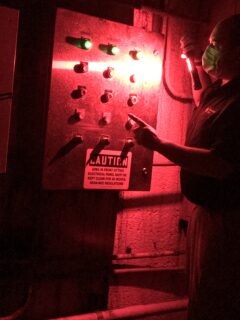 Losing electrical power at the Zoo during the day, even for just one second, can cause a ripple of effects across grounds. Losing power at the Zoo at night means I’m definitely getting in my daily steps and, depending on how bad the outage is, there might be some sleepy people needing to come back on grounds.
Losing electrical power at the Zoo during the day, even for just one second, can cause a ripple of effects across grounds. Losing power at the Zoo at night means I’m definitely getting in my daily steps and, depending on how bad the outage is, there might be some sleepy people needing to come back on grounds.
Why all this to-do about the electricity? Well, think about the inconveniences you experience for your household and then imagine if your house was the home of 5,485 residents! We don’t have to worry about the contents of just one refrigerator and freezer; we have separate units all over grounds plus an entire building dedicated to the stored refrigerated and frozen food items of our animals.
For many of our animal residents, being without power for too long can turn into a life and death situation. We have 1,097 individual fish living here at the Houston Zoo, and they depend on the electricity that powers their filters and pumps to keep the water in which they live and breathe oxygenated and clean. Imagine if losing the power to your house also meant that you now had a limited amount of air to breathe! We have to make sure their life support systems are back online as soon as possible!
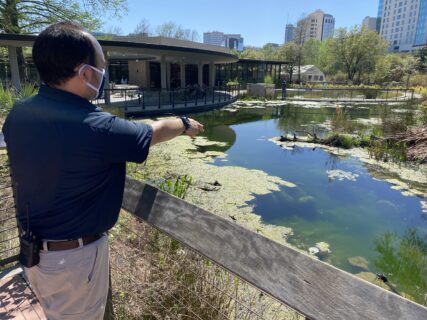 Because we know so many lives depend on our having reliable electricity, the Houston Zoo is very well-prepared for power outages. For each of the essential buildings (like the animal nutrition warehouse, our vet clinic, and our bird egg incubation room, etc.) we have permanent emergency generators installed that come on automatically when the power goes off. We also have a dedicated team of electricians who work hard, and sometimes around-the-clock, to make sure these permanent generators are working correctly; that replacement portable generators are available if they are needed; and that zoo-wide power gets restored as quickly as possible.
Because we know so many lives depend on our having reliable electricity, the Houston Zoo is very well-prepared for power outages. For each of the essential buildings (like the animal nutrition warehouse, our vet clinic, and our bird egg incubation room, etc.) we have permanent emergency generators installed that come on automatically when the power goes off. We also have a dedicated team of electricians who work hard, and sometimes around-the-clock, to make sure these permanent generators are working correctly; that replacement portable generators are available if they are needed; and that zoo-wide power gets restored as quickly as possible.
And, of course, at night we have the Night Team! So where do I (and my supervisor – we have someone here seven nights a week) fit into all this?
Well, we go around and check on all the systems across Zoo grounds that should be on generators, contact the necessary curators and managers to let them know whether things are okay or if there are problems, and then we fix whatever problems we can fix before they and the electricians come in (if they need to).
Often this means that I find myself standing in front of panels of buttons and levers feeling a little like Laura Dern in “Jurassic Park”: ear glued to a phone while I receive instructions for which button to push, and lever to pull, next. Which is exactly what happened a few weeks ago when our Aquarium Curator had to walk me through restarting the filter pumps for our Coral Reef tank in Natural Encounters.
On the plus side, I don’t have to worry about velociraptors suddenly jumping out at me, so the intimidation factor is reduced dramatically. This is because, unlike the fictitious dinosaur park, the Houston Zoo has designed all our animal habitats and night houses to be safe and secure during power outages and, yes, even during hurricanes.
Even so, if the power outage is due to a storm that could potentially bring down trees, I might still find myself inside the night houses of our carnivores, making sure they are secured inside their buildings.
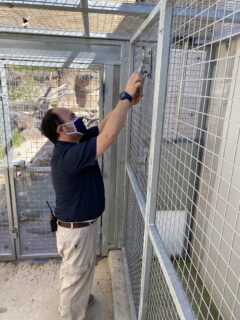 Once the power is back on, the work still doesn’t stop. Just like your microwave clock or VCR (Gosh, remember VCRs?) might need to be reset after a power outage, all the lighting timers on grounds will eventually be checked and staff will make sure that all non-animal-related electrical equipment is working correctly. Now this doesn’t necessarily happen at night, but it is still my job to go back to all the animal areas that I visited when the power first went off to make sure everything is fine now the power is back on. And, just like before, I let the necessary people know if anything is wrong and I fix whatever issues I find that I am capable of fixing.
Once the power is back on, the work still doesn’t stop. Just like your microwave clock or VCR (Gosh, remember VCRs?) might need to be reset after a power outage, all the lighting timers on grounds will eventually be checked and staff will make sure that all non-animal-related electrical equipment is working correctly. Now this doesn’t necessarily happen at night, but it is still my job to go back to all the animal areas that I visited when the power first went off to make sure everything is fine now the power is back on. And, just like before, I let the necessary people know if anything is wrong and I fix whatever issues I find that I am capable of fixing.
So the next time you wake up and find your microwave clock mysteriously flashing the wrong time, know that while you were sleeping and the power was out, there were people working hard at the Houston Zoo to make sure your favorite animals were being kept safe, secure and cared for.
Because here at the Houston Zoo we aren’t just working to save animals in the wild from 9 to 5. We’re doing it all night, too.
Working Through Winter Storm Uri
When we start to hear the rumblings in the weather forecasts for major events such as tropical storms, hurricanes and, yes, severe winter storms, the Houston Zoo enacts our ride-out team protocol. The ride-out team is formed of a few employees (and we’re talking 1-3 employees) from nearly every department of the Zoo: the safety and security team, facilities, maintenance, electricians, life support systems, food services, animal nutrition, veterinary and every animal care department. This bare-bones team of volunteers (as in they volunteered to be on the ride-out team… they’re still being paid for their time) eat, sleep, and work at the Zoo for the duration of the emergency and are the only employees on grounds for that entire time. That’s right: they live at their job until it is safe for the other employees to return to work. This could be for just one night, or it could be for much longer — it all depends on what happens.
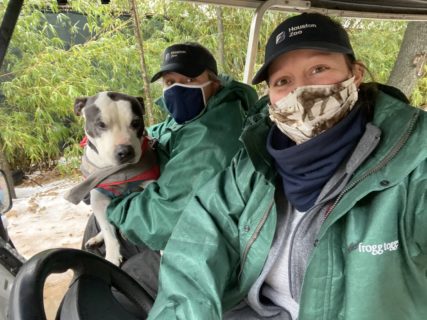 For Winter Storm Uri, the ride-out lasted 4 days and 5 nights, and they did not get any special promotional discounts or room upgrades during their stay. In fact, they dealt with the same problems that most of us were facing at home: freezing temperatures with no power or water and broken pipes. These Zoo heroes allowed the rest of their coworkers to stay safe (so we didn’t have to try and drive over icy roads) and provided the non-stop, first-rate care to all of our animal residents in which we at the Houston Zoo pride ourselves.
For Winter Storm Uri, the ride-out lasted 4 days and 5 nights, and they did not get any special promotional discounts or room upgrades during their stay. In fact, they dealt with the same problems that most of us were facing at home: freezing temperatures with no power or water and broken pipes. These Zoo heroes allowed the rest of their coworkers to stay safe (so we didn’t have to try and drive over icy roads) and provided the non-stop, first-rate care to all of our animal residents in which we at the Houston Zoo pride ourselves.
We take animal welfare very seriously here, and you can always rest easy knowing that whether there’s a power outage, boil water notice, ice storm, hurricane or flooding there are always people caring for the animals at the Houston Zoo.
